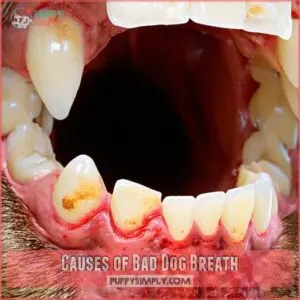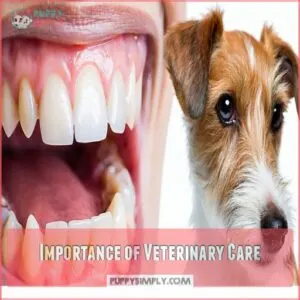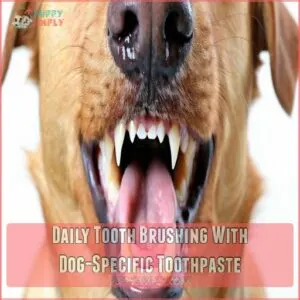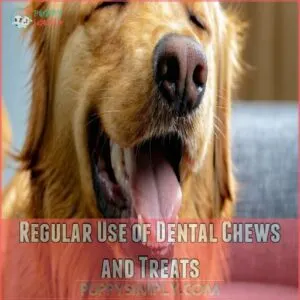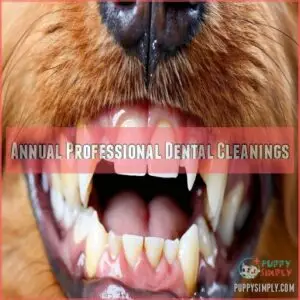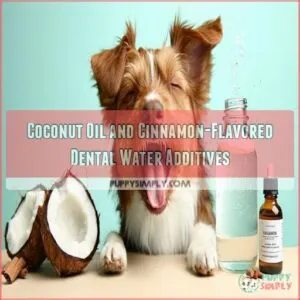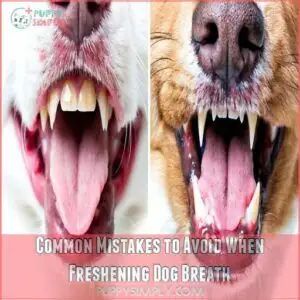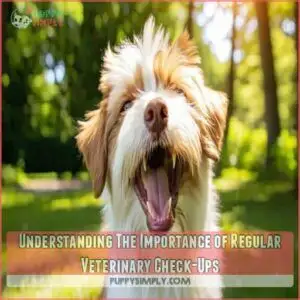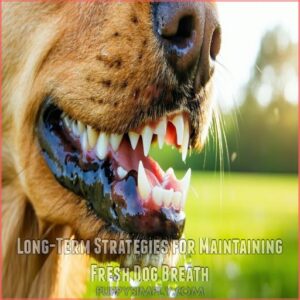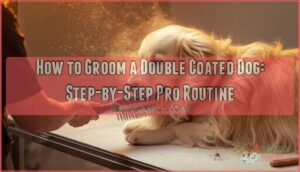This site is supported by our readers. We may earn a commission, at no cost to you, if you purchase through links.
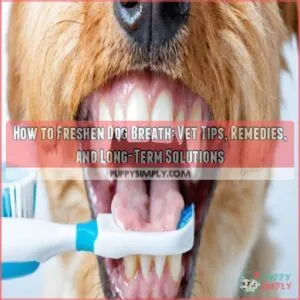
Start by brushing your dog’s teeth daily with dog-specific toothpaste to combat plaque and bacteria.
Toss in some VOHC-approved dental chews that’ll scrub those chompers while they munch. Try natural breath fresheners like crunchy carrots or a sprinkle of parsley in their meals.
Adding a dental water additive can zap odor-causing bacteria in one simple step.
Remember, persistent bad breath might signal deeper health issues, so don’t skip those annual vet check-ups. With consistent care, you’ll have your furry friend’s breath smelling fresh and clean in no time.
Table Of Contents
- Key Takeaways
- Causes of Bad Dog Breath
- How to Freshen Dog Breath Effectively
- Natural Remedies for Freshening Dog Breath
- Choosing The Right Products for Fresher Dog Breath
- Common Mistakes to Avoid When Freshening Dog Breath
- Understanding The Importance of Regular Veterinary Check-Ups
- Dietary Changes to Improve Dog Breath
- Long-Term Strategies for Maintaining Fresh Dog Breath
- Frequently Asked Questions (FAQs)
- How to give a dog a fresh breath?
- What can I do to get rid of bad breath?
- How can I keep my dog’s breath smelling fresh?
- Can You freshen a dog’s bad breath at home?
- How to get rid of bad breath in dogs?
- What can I give my Dog if he has bad breath?
- How to get rid of smelly dog breath?
- Can I freshen my dog’s breath?
- What home remedy can I use for my dog’s breath?
- Can I give my dog anything for bad breath?
- Conclusion
Key Takeaways
- You’ll want to brush your dog’s teeth daily with dog-specific toothpaste to combat plaque, bacteria, and prevent periodontal disease that causes bad breath.
- Learn to recognize that bad breath isn’t just an odor issue; it can signal serious health problems like diabetes, kidney disease, or liver issues that require immediate veterinary attention.
- You can naturally freshen your dog’s breath by incorporating dental chews, crunchy vegetables, apple cider vinegar, and probiotics into their diet while avoiding toxic human products.
- Establishing a consistent oral care routine that includes annual professional dental cleanings, regular vet check-ups, and strategic home care will help maintain your dog’s overall dental health and prevent chronic bad breath.
Causes of Bad Dog Breath
Bad dog breath isn’t just unpleasant—it’s usually a sign something’s wrong.
From gum disease to stinky snack choices, understanding the cause is key to fixing the problem.
Oral Hygiene and Periodontal Disease
Dog oral hygiene is vital in fighting plaque buildup and preventing periodontal disease. Without care, gum disease sets in, causing bad breath and worse.
- Daily toothbrushing techniques with dog-safe toothpaste.
- Use tartar control dental chews. Explore gum and dental health products for maintenance.
- Regular periodontal treatments from a vet.
- Invest in professional dog teeth cleaning annually.
Unpleasant Dietary Habits
Eating habits can stink—literally. Snacking on garbage, indulging in coprophagia (yes, poop-eating), or scavenging food scraps often leads to bad dog breath.
A controlled diet and careful treat selection can help curb dog breath odor.
In addition, regular veterinary cleanings can also help identify and prevent dental problems that may contribute to bad breath, such as periodontal disease.
Check out the table below for quick fixes:
| Problem | Cause | Solution |
|---|---|---|
| Garbage | Rotten food smells | Secure trash cans |
| Coprophagia | Foul-smelling breath | Discourage behavior |
| Food scraps | Odor buildup | Feed proper diet |
Diabetes
When diabetes hits your furry friend, bad breath becomes a telltale sign of deeper health challenges. This metabolic disorder can transform your pup’s breath into an unexpected warning system.
- Sweet, fruity breath odor
- Increased thirst and frequent urination
- Unexplained weight loss despite normal appetite
Monitoring blood glucose and working closely with your vet becomes in managing this complex condition.
Kidney Disease
Kidney disease can turn your dog’s breath into a tell-tale alarm bell for serious health issues.
Veterinary kidney tests reveal early signs that bad breath might signal something more complex than dental problems.
Prompt diagnosis and dietary adjustments can greatly improve your pup’s prognosis, helping manage these challenging dog breath problems before they escalate.
Liver Disease
If your pup’s breath suddenly smells like a forgotten lunch, liver disease might be throwing a curveball. Dog liver problems can trigger funky breath that screams "something’s off."
Veterinarians recommend liver function tests to pinpoint issues.
These tests help uncover underlying causes and guide treatment options, potentially saving your furry friend from more serious health complications down the road.
How to Freshen Dog Breath Effectively
If your furry friend’s breath could clear a room, you’re not alone in this stinky situation.
Treating bad dog breath isn’t just about masking odors, but understanding and addressing the root causes.
consistent oral care, veterinary guidance, and targeted solutions that’ll have your pup’s breath smelling fresh and clean.
Importance of Veterinary Care
When funky dog breath starts raising eyebrows, your veterinarian becomes your best ally in solving the mystery.
Regular vet oral care products can play a significant role in maintaining your dog’s oral health.
Preventative care goes beyond surface-level sniffing, uncovering potential underlying issues that might be lurking beneath.
Professional dental health assessments can diagnose disease early, offering targeted treatment options that keep your furry friend’s mouth—and overall health—in tip-top shape.
Daily Tooth Brushing With Dog-Specific Toothpaste
Most veterinarians agree that daily dog teeth brushing is your secret weapon against bad breath.
Dog-specific toothpaste, packed with enzymatic formulas, breaks down plaque and tartar more effectively than human alternatives.
Brush gently in circular motions for 30-60 seconds, targeting all tooth surfaces. Consistency is key—make it a bonding ritual that keeps your pup’s smile fresh and healthy.
When selecting a dog toothpaste, look for products that have earned Veterinary Oral Health Council approval, as they meet rigorous standards for safety and effectiveness.
Regular Use of Dental Chews and Treats
If you’re battling your furry friend’s bad breath, dental chews and treats are your secret weapon.
These bite-sized breath fresheners work overtime, scraping away plaque and tartar while your pup thinks they’re just getting a tasty reward.
Choose VOHC-approved options with natural ingredients, aiming for chew toys that take 5-10 minutes to gnaw through for maximum dental benefits.
Annual Professional Dental Cleanings
Boost your dog’s dental health with annual professional cleanings – a critical shield against bad breath and oral diseases. Your veterinarian becomes your partner in maintaining pristine canine dental wellness.
Here’s why these cleanings are a game-changer:
- Thorough plaque and tartar removal beyond home care
- In-depth oral health assessment
- Early detection of potential dental issues
- Professional-grade cleaning techniques
- Anesthesia-assisted deep cleaning for hard-to-reach areas
Natural Remedies for Freshening Dog Breath
If your dog’s breath could knock over a skunk, it’s time to explore some natural remedies.
From crunchy carrots to apple cider vinegar, you’ll discover simple, vet-approved solutions.
These solutions can transform your furry friend’s breath from stinky to sweet without breaking the bank.
Crunchy Vegetables and Fruits for Cleaning Teeth
Just cleaned your dog’s teeth with a toothbrush?
Give those pearly whites a break with nature’s dental helpers.
Crunchy dog-safe fruits and veggies like carrots and apple slices (minus seeds) work wonders. They scrape away plaque while providing a satisfying crunch.
These natural dental chews help freshen dog breath and keep those chompers clean – a win-win for your furry friend’s oral health.
Apple Cider Vinegar and Curly Parsley for Antibacterial Properties
After munching on those crunchy carrots, you’ll want to add another secret weapon to your dog’s breath-fighting arsenal.
Apple cider vinegar (ACV) and curly parsley pack a punch against bad breath.
A half-teaspoon of ACV in water and 1-3 teaspoons of chopped parsley can work wonders, targeting harmful bacteria and neutralizing odors naturally. Always check with your vet first.
Coconut Oil and Cinnamon-Flavored Dental Water Additives
Building on apple cider vinegar’s antibacterial properties, coconut oil offers another natural breath-freshening solution for your furry friend.
- Antibacterial properties combat oral bacteria
- Cold-pressed oil supports overall dental health
- Easy to apply during tooth brushing routine
- Affordable natural dog breath remedy
Cinnamon-flavored dental water additives provide an extra punch, neutralizing odors and making your pup’s breath more pleasant.
Raw Animal Bones and Plain Yogurt for Supporting Gut Health
Looking to level up your pup’s breath game? Raw bones and plain yogurt might just be your secret weapons. While coconut oil works wonders, these gut-health heroes can transform your dog’s oral ecosystem.
Just remember: bone size matters, and always supervise chewing.
Let’s explore how these natural dog breath remedies can keep your furry friend’s mouth fresh and healthy.
| Raw Bone Type | Size Guidelines | Chewing Safety |
|---|---|---|
| Beef Knuckle | Large Dogs Only | Always Supervise |
| Lamb Bones | Medium Breeds | No Cooked Bones |
| Turkey Neck | Small Dogs | Monitor Closely |
| Beef Marrow | Larger Breeds | Check for Splinters |
| Chicken Wing | Puppies/Small Dogs | Remove After 10 Min |
Choosing The Right Products for Fresher Dog Breath
In tackling your dog’s bad breath, you’ll want to arm yourself with the right arsenal of products that target oral health effectively.
From dental powders and probiotic treats to water additives and veterinary-recommended diets, choosing the right solutions can transform your pup’s breath from funky to fresh.
Dog Dental Powder for Cleaning Hard-to-Reach Areas
After tackling natural breath-freshening remedies, it’s time to zoom in on dog dental powder—your secret weapon for cleaning those tricky, hard-to-reach areas.
These magical powders target tartar buildup where brushes can’t, breaking down plaque with precision.
Sprinkle the best dog dental powders directly onto food, watching them work their breath-transforming magic without stressing your furry friend out.
Dog Dental Sticks as Flavored Probiotic Treats
Building on dental powder’s power, dental sticks offer a tastier breath-freshening approach for pups. These flavored probiotic treats combine oral care with tail-wagging enjoyment.
- Combat plaque with every chomp
- Deliver gut-friendly bacteria
- Satisfy chewing instincts naturally
- Provide mental stimulation
- Make oral care feel like a treat
Check out why dogs love them: when choosing the right dog toothpaste, be sure to look for the Veterinary Oral Health Council approval.
Veterinarian-approved dog dental sticks: your breath-fighting sidekick.
Dog Dental Water Additives for Reducing Harmful Bacteria
Dental water additives are your secret weapon against canine bad breath. These magical drops transform your dog’s drinking water into a bacteria-fighting fortress, targeting plaque and tartar with ease.
Check out this quick guide to finding the perfect breath-freshening solution: Regular use of dental water additives, such as VOHC-approved products, can help prevent periodontal disease.
| Feature | Benefit | Considerations |
|---|---|---|
| Enzymatic Action | Breaks down bacteria | Look for VOHC approval |
| Natural Ingredients | Supports oral health | Avoid xylitol |
| Easy Application | One teaspoon per bowl | Change daily |
| Breath Freshening | Reduces offensive odors | Most effective for small breeds |
| Cost-Effective | Complements dental care | Not a replacement for cleanings |
Veterinary-Recommended Oral Health Diets
After zapping bacteria with water additives, you’ll want to look into veterinary-recommended oral health diets.
These specialized food options pack a punch against bad breath, targeting plaque and tartar with strategic ingredients.
Your vet can guide you to prescription diets that support dog dental health, considering your pup’s unique needs and budget.
Think of it as a nutritional shield for those pearly whites.
Common Mistakes to Avoid When Freshening Dog Breath
Regarding freshening your dog’s breath, you’ll want to steer clear of common pitfalls that could harm your furry friend’s health.
Avoiding toxic human toothpaste is crucial.
Consulting your vet before trying home remedies is also important.
Understanding these mistakes can help you keep your pup’s breath fresh and their mouth healthy.
Using Human Toothpaste and Unsupervised Chewing
When choosing dental care, steer clear of human toothpaste – it’s toxic for your furry friend. Xylitol and fluoride can wreak havoc on your dog’s health.
Always pick dog-specific toothpaste and monitor chewing to prevent choking or injuries that could turn a breath-freshening routine into an emergency.
Similarly, leaving your pup unsupervised with chew toys or bones is like walking a tightrope.
Not Supervising Dogs When Using Crunchy Treats
One wrong move with crunchy treats could turn a breath-freshening moment into a dangerous situation.
Always watch your pup closely while they’re munching on dental chews or crunchy breath fresheners. Supervision isn’t just smart, it’s a lifeline for your furry friend.
Size matters – pick treats that match your dog’s breed and chewing style. Choking hazards lurk everywhere.
Not Implementing Gradual Diet Changes
In the midst of addressing your dog’s bad breath, diving headfirst into diet changes without careful planning can backfire spectacularly. Sudden shifts in food can trigger digestive chaos and worsen canine dental issues.
Incorporating the right fresh breath dog food can be a key step in freshening dog breath.
- Introduce new foods gradually over 7-10 days
- Mix old and new diets, increasing new food percentage slowly
- Monitor dog for signs of food sensitivities or digestive upset
Not Consulting a Veterinarian Before Using Home Remedies
Though tempting to trust DIY solutions, skipping a veterinarian consult before trying home remedies for dog bad breath can mask serious underlying health issues.
For example, a sweet or fruity breath odor could indicate serious medical conditions like diabetes, while your furry friend’s halitosis might signal kidney disease, diabetes, or dental problems that home treatments can’t fix.
Always prioritize a professional vet visit to safeguard your dog’s breath and overall health aren’t compromised by well-intentioned but potentially risky home interventions.
Understanding The Importance of Regular Veterinary Check-Ups
Regular veterinary check-ups are your secret weapon in maintaining your dog’s oral health and catching potential issues before they become serious problems.
By scheduling annual dental assessments, you’ll freshen your pup’s breath and also prevent costly and painful health complications down the road.
Early Detection and Prevention of Health Issues
Beyond the surface of your dog’s breath lies a world of potential health clues waiting to be uncovered. Early detection can be your best defense against serious medical conditions.
Regular home brushing techniques can help prevent bacteria buildup and bad breath.
Here’s why staying vigilant matters:
- Track breath odor changes as potential health warnings
- Monitor accompanying symptoms like digestive issues
- Note frequency and intensity of breath transformations
- Observe changes in eating habits or oral discomfort
Maintain regular health checkups to catch underlying conditions early
Regular Dental Assessments and Cleanings
Early health screenings set the stage for pristine canine dental wellness.
Your vet recommends annual dental checkups to catch potential issues before they snowball.
During these visits, professionals assess your dog’s dental health, recommend cleaning frequency, and evaluate anesthesia safety.
Additionally, these checkups can help identify signs of periodontal disease, which can be prevented with regular canine dental care tips.
Professional dog dental cleanings might cost $200-$500, but they’re a small price compared to preventing costly future treatments.
Dietary Changes to Improve Dog Breath
What you feed your dog can play a significant role in battling bad breath and supporting overall oral health.
By making strategic dietary changes and incorporating breath-freshening ingredients, you’ll help combat the bacterial buildup that causes those unpleasant odors and promote your furry friend’s wellness. This will improve your dog’s oral health.
Choosing Breath-Friendly Dog Food
Regular vet visits can shed light on your pup’s dietary needs when battling bad breath.
Premium dog food brands with high-quality ingredients can be game-changers.
Look for grain-free options that support dental health, minimize food sensitivities, and provide balanced nutrition. Budget-friendly canine dental diets exist – don’t break the bank searching for breath-friendly solutions that keep your furry friend healthy and fresh.
Incorporating Breath-Freshening Ingredients in Meals
After selecting high-quality dog food, you can supercharge your pup’s breath with strategic mealtime breath fresheners.
Sprinkle chopped parsley (1-3 teaspoons) into their food every few days for natural deodorizing.
A spoonful of plain yogurt supports gut health, while a dash of apple cider vinegar battles bacteria. These home remedies work wonders in your dog’s daily diet.
Water Additives for Fresher Breath
Just seasoned your pup’s veggies with parsley?
Now, let’s jazz up their water. Dog dental water additives are your secret weapon against bad breath.
These liquid lifesavers reduce harmful bacteria without the hassle of brushing.
Look for brands with the Veterinary Oral Health Council seal, packed with breath-freshening ingredients that’ll have your furry friend’s kisses smelling sweeter.
Foods to Avoid for Better Breath
The bane of fresh dog breath often lurks in everyday human foods.
Steer clear of chocolate and xylitol, which can be toxic to your pup.
Garbage, spoiled food, and cooked bones are definite no-nos that can trigger terrible dog breath and serious health risks.
Keep your furry friend safe by being vigilant about what goes in their mouth.
Long-Term Strategies for Maintaining Fresh Dog Breath
Want a long-term solution to your dog’s stinky breath that goes beyond quick fixes?
Developing a consistent oral care routine with your veterinarian’s guidance can help prevent dental issues and keep your furry friend’s mouth healthy and fresh.
Establishing a Consistent Oral Care Routine
Master your dog’s breath care by creating a rock-solid daily routine that tackles oral health head-on. Consistency is your secret weapon in preventing doggy halitosis and maintaining dental wellness. Invest in a high-quality dog toothbrush tool to make daily brushing a breeze.
- Schedule daily brushing with dog-specific toothpaste
- Rotate different dental treats and chew toys
- Incorporate water additives for bacteria reduction
Track professional cleaning appointments annually
Replace oral care tools every few months
Educating Family Members on Dog Breath Care
Maintaining fresh dog breath becomes a team effort when everyone pitches in.
Get family members on board by sharing what you’ve learned about oral care.
Assign age-appropriate tasks like helping choose breath-friendly products or tracking dental care schedules. Create a fun chart to track your pup’s dental routine, making dog breath care a shared responsibility that keeps your furry friend healthy and happy.
Regular Veterinary Check-Ups and Dental Assessments
Because your dog’s health is a team effort, regular veterinary check-ups are your secret weapon against nasty breath and hidden dental issues.
- Early detection prevents expensive, painful treatments
- Professional dental cleaning removes stubborn tartar
- Thorough health screenings catch potential problems before they escalate
Your vet can spot subtle signs of periodontal disease and recommend personalized preventative care strategies that keep your furry friend’s smile bright and breath fresh.
Frequently Asked Questions (FAQs)
How to give a dog a fresh breath?
Just caught your pup’s funky breath? You’re not alone!
Brush their teeth with dog-specific toothpaste 2-3 times weekly.
Use dental chews.
Add parsley to meals.
Schedule a vet check to tackle underlying health issues.
What can I do to get rid of bad breath?
Brush your pup’s teeth daily with dog-specific toothpaste, offer dental chews, and add parsley or apple cider vinegar to their diet.
When persistent, consult your vet to rule out serious health issues causing that funky breath.
How can I keep my dog’s breath smelling fresh?
Like a breath mint for your furry friend, tackle bad dog breath.
by daily toothbrushing with dog-safe toothpaste, dental chews, and vet check-ups.
These steps zap odor-causing bacteria and keep your pup’s smile fresh and healthy.
Can You freshen a dog’s bad breath at home?
You’ve got quick fixes for your pup’s stinky breath!
Try apple cider vinegar in water, parsley sprinkled on food, and dental chews.
Coconut oil during tooth brushing helps neutralize odors.
Just watch for any underlying health issues.
How to get rid of bad breath in dogs?
Max’s bulldog suffered from persistent bad breath until his vet revealed hidden dental issues.
You’ll tackle doggy breath by brushing teeth daily, using dental chews, and getting professional cleanings.
to eliminate bacteria and prevent serious health problems.
What can I give my Dog if he has bad breath?
Got a pup with stinky breath?
Try dental chews, coconut oil, or parsley.
Brush their teeth regularly with dog toothpaste.
When in doubt, consult your vet to rule out serious health issues that might be causing the funky odor.
How to get rid of smelly dog breath?
Brush your dog’s teeth daily with canine toothpaste, use dental chews, and add parsley or apple cider vinegar to their diet.
If bad breath persists, visit your vet to rule out underlying health issues.
Can I freshen my dog’s breath?
Yo, time-traveling pup parent! You can zap that doggy breath by daily brushing with pet toothpaste.
Offering dental chews is another way to help.
Adding parsley or apple cider vinegar to their diet may also help – but always check with your vet first.
What home remedy can I use for my dog’s breath?
Try mixing a teaspoon of apple cider vinegar or fresh parsley into your dog’s water.
Offer crunchy carrots as treats, and consider dental chews.
These natural remedies can help combat bad breath while supporting your pup’s oral health.
Can I give my dog anything for bad breath?
When your pup’s breath could knock out a skunk, dental water additives or enzymatic toothpaste can be game-changers.
Your vet’s got the best advice for tackling that funky dog breath safely and effectively.
Conclusion
Ultimately, keeping your dog’s breath fresh isn’t just about masking odors—it’s about total health.
Did you know that over 80% of dogs develop dental disease by age three?
Tackling bad breath means consistent care: daily tooth brushing, vet check-ups, and smart product choices.
By understanding the root causes and implementing these strategies to freshen dog breath, you’ll improve your pup’s oral hygiene and also catch potential health issues early.
Your furry friend will thank you with fresher kisses and better overall wellness.
- https://www.akc.org/expert-advice/health/get-rid-of-stinky-dog-breath/
- https://www.roscoesbedandbark.com/wp2/7-natural-solutions-stinky-dog-breath/
- https://shop.animalbiome.com/blogs/pet-health/what-causes-bad-dog-breath-how-to-get-rid-of-it
- https://www.thefarmersdog.com/digest/natural-remedies-for-dogs-with-bad-breath/
- https://be.chewy.com/health-wellness-6-ways-to-naturally-freshen-your-dogs-breath/

